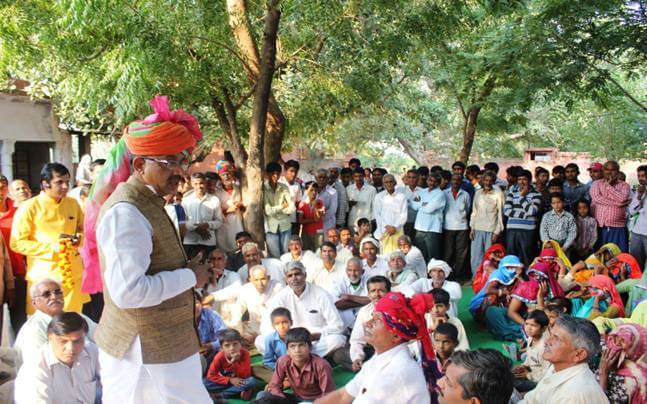This Blog is written by Tanvi Sanjay Rane from Dr. D.Y. Patil College of Law, Maharashtra. Edited by Karan Dutt.
Privacy literally means the quality of being secluded from the presence or view of others or the condition of being concealed or hidden. It entails the quality or state of being apart from company or observation. It is the freedom from unaccredited invasion. It is an important aspect of human dignity and is inseparable from a dignified human existence. It has thus been recognised as a fundamental human right in…
This Blog is written by Saptaswara Chakraborty from North Eastern Hill University, Meghalaya. Edited by Pranoy Singhla.
The court fees is levied by the government on the people who are seeking judicial remedies through a legislation. This structured form of levitation from the people ensures that the economy of the court gets maintained. The concept of court fee for the very first time was introduced by the Britishers in the year 1795 through Regulation 38 and was implemented in various Presidencies including the Bengal…
This Blog is written by Bhagyashree Dutta from Amity University, Mumbai. Edited by Pranoy Singhla.
Urbanization has grown rapidly over the years, it is evident that urbanization is not only a determinant of economic development, but also a consequence of it. The ability of a nation to accomplish its economic goals is dependent on its ability to govern its cities, hence urban management and governance has gained significant importance. This is partly attributable to the fact that metropolitan centers make a…
This Blog is written by Oshin Suryawanshi from Amity Law School, Noida. Edited by Karan Dutt.
The practice of imposing a legal maximum (rent ceiling) upon the rent during a particular housing market, below the equilibrium rent is named rent control. But if the rent is about at A level below the equilibrium rent, it’ll necessarily cause a situation of excess demand or shortage. During a free market, prices (here, rents) would rise automatically filling the gap between the demand and therefore the supply…
This Blog is written by Ruthika Reddy from St. Francis College for Women, Hyderabad. Edited by Ujjawal Vaibhav Agrahari.
For ages, alcoholic beverages have been in use in human societies, and their history is old as mankind. Alcohol consumption patterns are continually evolving, and today, alcohol is the most commonly consumed beverage in the world. India’s alcohol culture has grown as a result of colonization. Alcohol constitutes one of the most important products of the world addiction demand. The alcohol industry is seldom…
This Blog is written by Riya Gupta from Jindal Global Law School, Haryana. Edited by Ravikiran Shukre.
The two statutes that regulate the valuation of the suits are The Court Fees Act of 1870 and the Suits Valuation Act of 1887. The valuation done in order to determine the jurisdiction is done under the Suits Valuation Act 1887 and the valuation to determine the amount of court fees payable is regulated under the Court Fees act 1870. For the objective of determining the court fee in particular classes of suits, the fee can be…
This Blog is written by Soumya Bhardwaj from Bennett University, Greater Noida. Edited by Prakriti Dadsena.
The COVID-19 pandemic is our generation’s greatest global health crisis, as well as the world’s largest humanitarian issue since World War II. As countries seek to limit the virus’s spread, the number of cases continues to rise. When you look at the history of second waves, you’ll notice that they’ve always been more aggressive and larger in size than the first. This time…
This Blog is written by Himanshi Sharma from Delhi Metropolitan Education, GGSIPU, Noida. Edited by Ujjawal Vaibhav Agrahari.
The Punjab Courts Act has received the assent of the: Lieutenant- Governor of Punjab on 30th May 1918, Governor-General on 12th June 1918 and was first published in the Punjab Gazette on 12th July 1918. It is an act to validate all things done under the Punjab Courts Act, 1914 as amended by Punjab Act IV of 1914, to repeal the said acts or as so much of them as…
This Blog is written by Shaurya Nagpal from Bennett University, Greater Noida. Edited by Prakriti Dadsena.
Land consolidation is the process of readjusting and rearranging fragmented land parcels and ownership so as to form larger and judicious land holdings through proper planning. From an economic growth perspective, land reforms are considered to be the most crucial in bringing about agricultural improvements. A crucial aim of land consolidation has…
This Blog is written by Anusuya Ghosh from KIIT School of Law, Odisha. Edited by Prakriti Dadsena.
The Act specifies the mechanism for collecting land revenue, as well as the revenue officers who will have the ability to impose and collect land revenue, and the definition of an agriculture tenure for the purposes of computing revenue assessment periods. The act’s purpose is to consolidate a person’s or Bhoomiswami’s rights and responsibilities in relation…
This Blog is written by Andre Sachdeva from Vivekananda School of Law and Legal Studies, VIPS, New Delhi. Edited by Prakriti Dadsena.
Rent is the price or amount stipulated in the lease or tenancy agreement to be paid by the tenant to the landlord in exchange for exclusive ownership of the leased property for the term of the lease. Thus, in order to regulate rent in Maharashtra, the state government introduced the Maharashtra Rent Control Bill, 1999, which resulted in the Maharashtra…
This Blog is written by Vijayalakshmi Raju from Dr. Ambedkar Global Law Institute, Tirupati. Edited by Ravikiran Shukre.
The first major agrarian reform after independence was the obligation of the Zamindari System. Even before the adoption of the Indian Constitution, Zamindari’s abolition measures had begun. The Zamindari Abolition Committee was launched by many syndicate provinces, including the Central Provinces, United Provinces, Bihar, Assam, Madras, and Bombay. The…
This Blog is written by Anvaya Singh from Amity Law School, Noida. Edited by Ravikiran Shukre.
The Government of India enacted the Delhi Rent Control Act in 1958 with the intention to safeguard the migrants who are staying on rent in Delhi in particular. Also, each state has its own rent control act as just one that governed the whole country during those times would have proved to be unsuitable in many regions and areas because every state has its own customs…
This Blog is written by Vijayalakshmi Raju from Dr.Ambedkar Global Law Institute, Tirupati. Edited by Ravikiran Shukre.
The Lok Sabha approved The Specific Relief (Amendment) Bill, 2018 in mid-March 2018 by voice vote without debate, amending an existing Act, The Specific Relief Act 1953, that has not been altered since its commencement. This bill sought to give a contractual party the ability to seek damages from the other party in the event of a commercial contract violation…
This Blog is written by Anindo Chatterjee from Amity Law School, Noida. Edited by Prakriti Dadsena.
Rent Control Acts are common throughout the country that is India. The primary reason for this is the impending threat of exploitation by the landlords which it’s been a thorn in the flesh for the authorities in addition to the tribunal. Without any regulation landlords might go on a rampage and exploit the life out of the tenants, other issue is tenants exploiting their…
This Blog is written by Anish Bachchan from Amity Law School, Noida. Edited by Ravikiran Shukre.
March 22nd, 2020, when our prime minister declared a nationwide lockdown all over India. In just a matter of few days, our daily lives have changed. With it, we started to live the new reality. A reality, we once thought could never happen but it did anyway. I’m talking about the stay-at-home procedure.
This Blog is written by Tanvi Sanjay Rane from Dr. D.Y. Patil College of Law, Maharashtra. Edited by Ujjawal Vaibhav Agrahari.
Since time immemorial, the military has played a vital role in shaping history and securing the future of the world. Early men lived in tribes that consisted of gatherers, hunters, and protectors. According to the Upanishadic interpretation of the law, the function of law is to ensure the social security of men and the existing social institutions.
This Blog is written by Akshara Lagisetty from Amity University, Mumbai. Edited by Prakriti Dadsena.
The Panchayati Raj Institution system is the Rural Local Self Government in India. In the urban areas, the administration of the government is easier to function as all the functionaries are available and dispose of the issues in a timely manner, whereas in the rural areas where the administrative functionaries are difficult to reach and their issues go unnoticed or cannot be easily addressed.
This Blog is written by Illa Mathi Maran from UPES, Dehradun. Edited by Ravikirna Shukre.
The act of drugs and cosmetics is the act which was made in 1940, the pre-independent era. The act of drugs and cosmetic’s played a major role in the pharmaceutical department. This act was mostly on a part of check and balance in the area of pharmacy.
This Blog is written by Ayushee Priya from KIIT School of Law, Odisha. Edited by Ravikirna Shukre.
In our society, there are individuals and groups who have a different mindset to deal with a particular kind of situation. So, there are chances of disputes between the individuals or the groups or the individuals and the groups. Disputes must be settled otherwise there would irregularity, disturbance, and disorganization.
This Blog is written by Snegapriya VS from VIT Law School, Chennai. Edited by Lisa Coutinho.
The Indian tolls Act falls under the ministry of road transport and highways. The enactment of which is to confer the government with the power to levy tolls on public roads and bridges. Primarily, why do we pay a toll? And how it works? The people opt for state and national highways for faster traveling since it is less congested and lacks complex traffic.
This Blog is written by Barnali Das from KIIT School of Law, Odisha. Edited by Prakriti Dadsena.
For a very long time, in every place in the world, whenever and wherever the norms of the society are violated by the media industry and the unprofessional conduct of the press impairs its freedom, the authorities, as well as the Press itself, has felt the necessity of such a mechanism or any way that can keep an eye on it and control it.
This Blog is written by Wafiya Tunnisa from Middlesex University, Dubai. Edited by Ritika Sharma.
In this millennial era, where more than 90% of the time of a person is spent on social media and electronic devices, it is has become very easy for every citizen of this country to practice freedom of expression and freedom of placing their views and ideas in front of the world without any restriction. Whilst this ideology, like everything else there have been good and bad impacts on each one’s life.
This Blog is written by Sidrah Jami from Amity Law School, Noida. Edited by O.S.S.Sarada Rasagnya.
Drugs are considered to be one of the most evolving items worldwide. It is used for medicinal purposes and the advertisement of drugs is legalized in various countries. The paper firstly provides an introduction to drugs. Secondly discusses the significance of the development referring to The Drugs and Magic Remedies (Objectionable Advertisements) Act, 1954 and studies the impact after the implementation of the act.
This Blog is written by Sidrah Jami from Amity Law School, Noida. Edited by Saumya Tripathi.
Media plays an important role in every individual’s life. It has evolved over the years. The paper firstly provides an introduction to the media and then discuss the significance of the development. Referring to the Prasar Bharti (Broadcasting Corporation of India) Act 1990 and different elements of media.
This Blog is written by Sidrah Jami from Amity Law School, Noida. Edited by Naina Agarwal.
The Medical Termination of Pregnancy Act was passed by the Indian Legislature in 1971. This act has been considered a bold move in Indian society. It focused on the unwanted pregnancies in the country. The paper firstly provides an introduction to the abortion laws in India and abroad.
This Blog is written by Sidrah Jami from Amity Law School, Noida. Edited by Uroosa Naireen.
The cable television network is one of the most important topics that many countries have resolved through various talks. For a healthy democracy, it is essential that the institution of media is given due respect in spirit and law, that lays the basic foundation of democracy and that provides for an informed citizenry capable of making wise decisions, ultimately contributing to a well-functioned democracy.
This Blog is written by Shivanjali Mane from K.L.E. Society Law College, Chikodi. Edited by Uroosa Naireen.
On June 2020, the Ministry of Labor and Employment decided to consolidate 44 Central labor laws into four codes relating to wages, social security, industrial relations, and occupational safety and health based on the recommendations of the 2nd National Commission on Labor.
This Blog is written by Arth Ghiya from SVKM’s Pravin Gandhi College of Law, Mumbai. Edited by Harshita Yadav.
Broadcasting refers to the distribution of video or audio content with the help of any electronic mass communications medium to a dispersed audience. It assembles and programs any form of communication content like pictures, images and sounds, signals, writing, etc. in electronic form.
This Blog is written by Arpana Komal from Central University of South Bihar, Gaya. Edited by Harsh Sonbhadra.
CBFC stands for Central Board of Film Certification which is often referred to as the Censor Board which is a statutory body under the Ministry of Information and Broadcasting, regulating the public exhibition of films under the provisions of the Cinematograph Act 1952.
This Blog is written by Prachika Modi from KIIT School of Law, Odisha. Edited by Naina Agarwal.
A fee that is imposed on a plaintiff to file a case in the court of law. This fee is collected by the government on the people seeking judicial remedies through legislation. The concept of court fees was brought in order to prevent a vexatious lawsuit, which means cases filed in the court solely with an intention to harass the impugned party.
This Blog is written by Arpana Komal from Central University of South Bihar, Gaya. Edited by Naina Agarwal.
Workers who are employed in any work within the vicinity of any port for the aim of loading, unloading, movement, or storage of cargoes, i.e., anything carried during a ship or vessel, into or from a ship, port, dock, and storage place are referred to as dockworkers and for the smooth functioning of a corporation, the employer should ensure safety and security of his employees.
This Blog is written by Manmohit Bhalla from KIIT School of Law, Odisha. Edited by Ravikiran Shukre.
On October 15, 1983, the Government of India passed an Ordinance to set up courts for assurance of the inquiry whether an individual is or isn’t an unlawful migrant. which was further, followed up as an Act in the month in December, named as, the, Illegal Immigrants (Determination by Tribunals) Act, 1983.
This Blog is written by Arpana Komal from Central University of South Bihar, Gaya. Edited by Ravikiran Shukre.
In India, presently the law governing the admiralty jurisdiction of courts and related aspects of maritime law is too outmoded. The High Court’s jurisdiction to entertain maritime disputes results in letter patents. British established the legal system on this subject, and in India, there is no local legislation dealing with the same.
This Blog is written by Vidur Thanawala from Bennett University, Greater Noida. Edited by Prakriti Dadsena.
As per Prime Minister Shri Narendra Modi’s vision for increasing individuals’ investment and straightforwardness in the administration, the Ministry of Shipping has given the draft of the Aids to Navigation Bill, 2020 for recommendations from the stakeholders and overall population.
This Blog is written by Sidhida Varma S. from Government Law College, Thiruvananthapuram. Edited by O.S.S.Sarada Rasagnya.
The Motor Vehicles Act was enacted in 1988. This Act provides for the regulation of the aspects relating to road transport vehicles. It mainly deals with the laws relating to registration of motor vehicles, licensing of drivers, insurance, liability, offenses, and punishment for the same. It also gives emphasis to the provisions relating to state transport undertakings, traffic regulations, etc.
This Blog is written by Manmohit Bhalla from KIIT School of Law, Odisha. Edited by O.S.S.Sarada Rasagnya.
India has one of the largest postal services network, which includes approximately 1 lakh 54 thousand post offices out of which 1 lakh 37 thousand are located in the rural areas of the country as the postal services or the Indian post is one of the most important services for people living in villages.
This Blog is written by Amrusha Sengupta from Adamas University (School of Law and Justice) Barasat. Edited by Sonali Priyadarsani.
The Indian Soldiers (Litigation) Act, 1925 is an integral part of the military laws in India. It provides special protection to the Indian Soldiers who are party to a civil dispute especially when they are serving under special conditions. It gives them a special opportunity and their interest is protected when they are serving at war.
This Blog is written by Sidhida Varma S. from Government Law College, Thiruvananthapuram. Edited by Swati Pragyan.
The Pre-Conception and Pre-Natal Diagnostic Techniques Act was enacted with a view to curb female foeticides. Female foeticides lead to a decline in the sex ratio and to combat the same is the main objective of this Act. In India, a female child is considered a burden.
This Blog is written by Tamanna Kapoor from Symbiosis Law School, Noida. Edited by Amrith R.
The story of roads can be traced back to the start of human civilization, in the history of India itself there are mentions of roads when one reads about the Indus Valley civilization. Similarly, during the British Raj to there were acts and committees formed that looked into the road and infrastructure development of our country, irrespective of what their reasons were for setting them up.








































